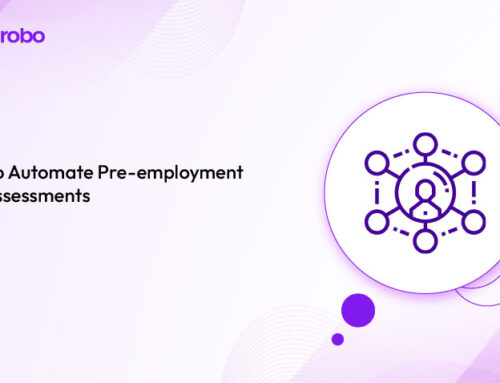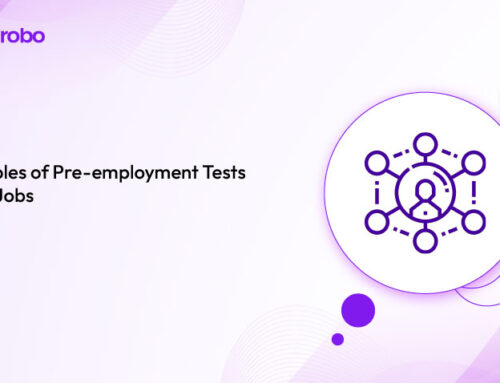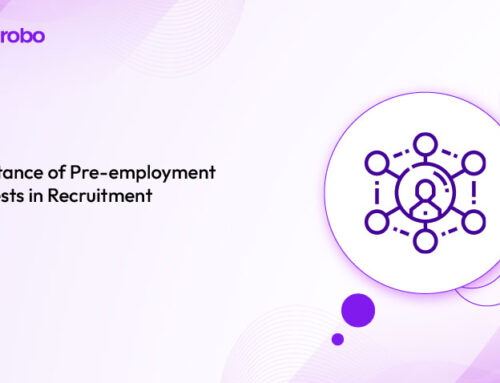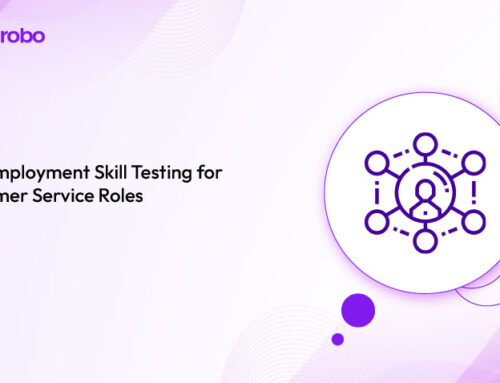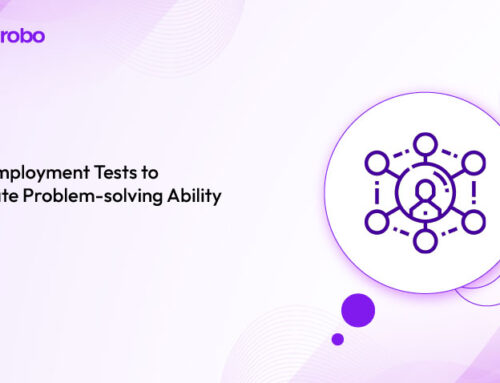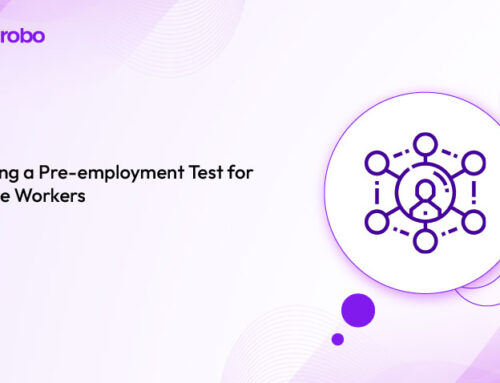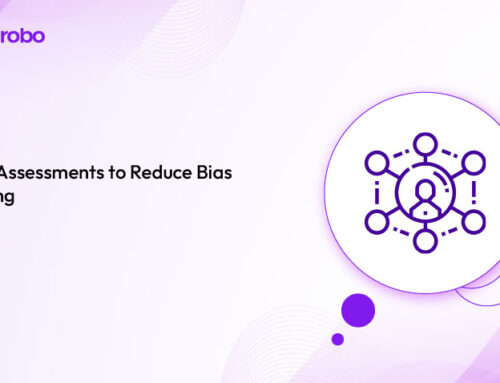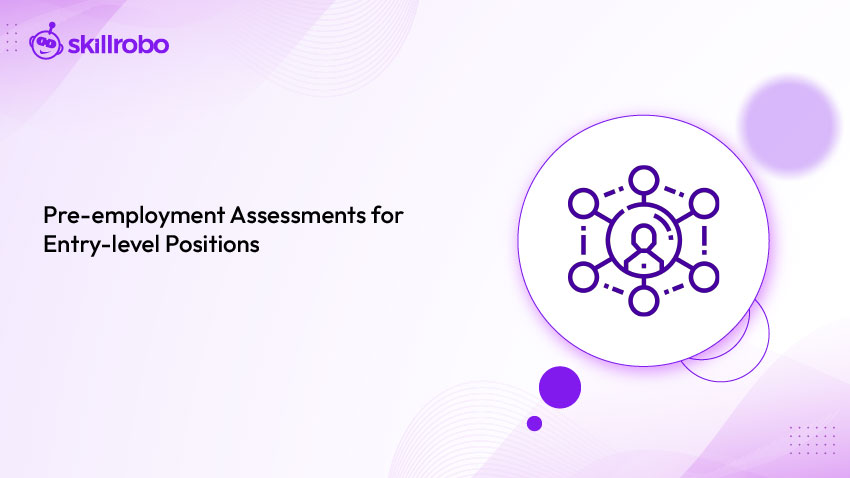
Key Takeaways
- Entry-level roles often receive high application volumes, making assessments essential for filtering the right talent.
- Pre-employment tests reveal core competencies like communication, reasoning, and learning agility in early-career candidates.
- Structured assessments improve hiring fairness and reduce reliance on academic background or unverified experience.
- Tools like Skillrobo enable fast, scalable, and role-specific assessment workflows tailored for entry-level recruitment.
Hiring for entry-level roles presents a unique challenge—most candidates lack prior experience, and resumes alone offer limited insight into job readiness. Relying solely on interviews or academic scores can lead to inconsistent or biased hiring decisions.
Pre-employment assessments help bridge this gap by evaluating fundamental skills and competencies that predict on-the-job success. When used correctly, these assessments offer a scalable, fair, and objective method to identify high-potential candidates at the start of their careers.
Why Entry-Level Roles Require a Different Hiring Approach
Unlike experienced roles, entry-level positions typically don’t demand specialized expertise. Instead, they require adaptability, cognitive ability, and a willingness to learn. Assessing these qualities without structured tools is difficult and error-prone.
Employers must shift focus from credentials to potential. Pre-employment tests offer a standardized method to measure aptitude, behavior, and basic job skills. This ensures that recruitment decisions are data-driven rather than based on assumptions or academic performance alone.
What Skills Should Entry-Level Assessments Measure?
Choosing the right type of assessment begins with identifying the core capabilities needed for success in a junior role. These are often soft skills and foundational traits that support future development.
The assessment should test attributes such as communication, logical reasoning, problem-solving, attention to detail, and adaptability. These skills serve as strong indicators of how well a candidate will perform, regardless of industry or department.
Incorporating cognitive assessments or general aptitude tests is especially effective at this stage, helping screen for natural ability and learning speed.
Types of Assessments Best Suited for Entry-level Candidates
Different roles require different testing formats. For entry-level hiring, it’s important to keep assessments focused, relevant, and time-efficient. Overly complex or lengthy assessments can create drop-offs or frustrate applicants.
Below are assessment types that are particularly well-suited for early-career positions. They provide enough differentiation between candidates without requiring previous job experience.
1. Cognitive Aptitude Tests
These measure problem-solving, learning ability, and logical reasoning. Candidates with high cognitive aptitude tend to learn faster and adapt well. This is essential for entry-level roles that involve training, multitasking, or growth potential. These tests provide a clear benchmark for foundational thinking skills.
2. Behavioral and Personality Assessments
Understanding how a candidate is likely to behave in a team or under pressure helps match personality to company culture. These tests assess reliability, motivation, and interpersonal style. Behavioral assessments offer insight into traits that impact team dynamics, especially when experience isn’t available as a filter. This supports better long-term hiring outcomes.
3. Communication Skills Tests
Effective communication is critical for almost all entry-level jobs, whether written or verbal. Assessments in this category evaluate grammar, clarity, active listening, and comprehension. These are especially useful in customer-facing, support, or collaborative environments. Poor communication skills at the entry level can result in avoidable performance issues later on.
4. Basic Job Simulations or Task-based Tests
These simulate real tasks the candidate may encounter on the job. They help test attention to detail, following instructions, or simple tech usage. For example, basic form-filling, email writing, or spreadsheet tasks can be included. These mini-assessments reflect the candidate’s readiness for the work environment.
Key Benefits of Pre-Employment Assessments in Junior Hiring
When thoughtfully designed and deployed, assessments elevate the overall hiring process for entry-level positions. They enable faster filtering, better candidate matching, and data-supported decisions. Below are specific benefits recruiters experience when assessments are embedded into early-career hiring workflows. These benefits are especially relevant in high-volume or fast-scaling environments.
1. Efficient High-volume Screening
Entry-level roles attract large applicant pools, making manual screening impractical. Assessments offer automated, scalable evaluation to rank candidates quickly. This improves recruiter efficiency and ensures no potential candidate is missed due to limited resume visibility. It also speeds up time-to-hire.
2. Reduction of Subjective Bias
Resumes often reflect educational privilege more than actual ability. Assessments level the playing field by evaluating skills that matter to the role. By relying on performance metrics rather than academic scores, recruiters reduce unconscious bias. This creates a more inclusive and equitable hiring process.
3. Improved Retention and Performance
Candidates selected through skills-based evaluation are more likely to succeed and stay in their roles. This reduces early turnover, which is common in junior positions. With better alignment between job expectations and actual ability, new hires ramp up faster. This contributes directly to cost savings and team stability.
Design Considerations for Entry-level Assessments
Assessment design plays a critical role in candidate engagement and result accuracy. Entry-level candidates often lack context or experience with hiring assessments, so tests must be intuitive and relevant.
Avoid overly technical language or complex formats. Tests should be mobile-friendly, brief, and job-aligned. Use simple instructions and offer a preview or demo, if possible,e to reduce test anxiety.
Additionally, ensure that assessments are regularly reviewed for fairness, bias, and job relevance. Updating test content based on hiring feedback improves future outcomes.
The Role of Skillrobo in Entry-level Assessments
Skillrobo offers a flexible platform designed to support scalable and skill-based hiring for entry-level roles. It enables recruiters to create custom assessments that test cognitive aptitude, behavioral fit, communication ability, and role-readiness—all without requiring coding expertise.
With features like role-based templates, mobile-compatible test delivery, and automated scoring, Skillrobo streamlines the screening process for high-volume entry-level recruitment. Recruiters can manage everything from test assignments to performance comparisons within one centralized platform.
Skillrobo also offers behavioral and cognitive tests built specifically for early-career talent. With detailed analytics, organizations can move from resume screening to skill validation with minimal effort. This reduces hiring bias and ensures every candidate is measured fairly, regardless of background.
Final Thoughts on Hiring for Potential
When hiring entry-level talent, the focus should shift from experience to potential. Pre-employment assessments provide an objective, consistent method for identifying potential across large applicant pools. They improve hiring speed, reduce bias, and raise the overall quality of hire.
Employers looking to build resilient, high-performing teams from the ground up must prioritize fair and skills-based recruitment. Assessment platforms like Skillrobo make this possible at scale by turning potential into measurable performance indicators.
Ready to make better entry-level hiring decisions? Sign up with Skillrobo to streamline candidate evaluation and hire for long-term growth.



